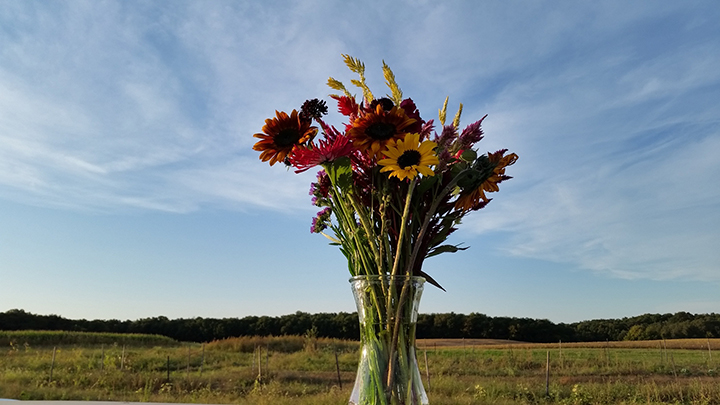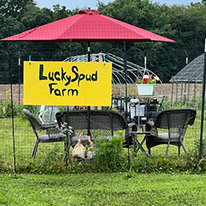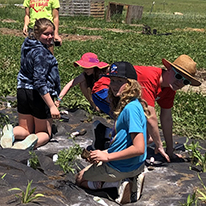Owners: Molly Stentz and John Peck
What they grow: More than 50 varieties of fresh cut flowers, plus several dozen varieties of fresh vegetables.
Where you can buy from Yellow Dog Flowers and Produce: We are vendors at the Northside Farmers Market in Madison every Sunday from late June until mid October, open Sunday mornings from 8:30am until 12:30. Near Warner Park and the Willy Street Co-op.
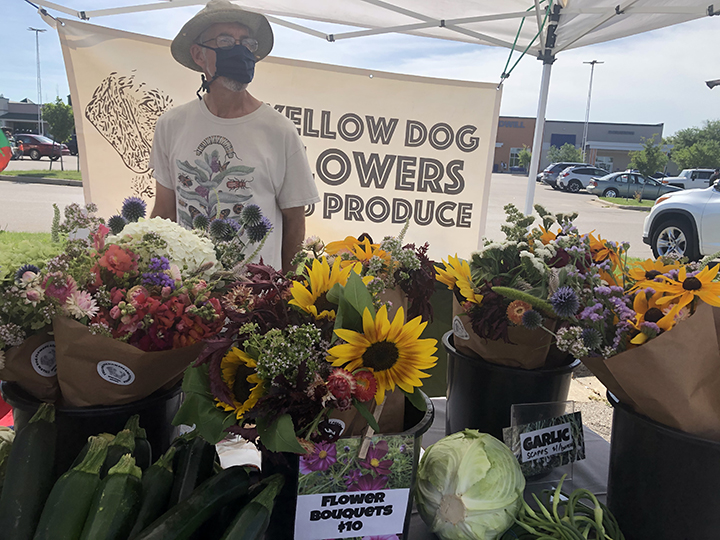
John Peck vends at the Northside Farmers Market
Yellow Dog Flowers and Produce was one of the first Grower Partners to take advantage of the agriculture incubator that is Silverwood Park. Their first seeds went into the ground in Spring, 2017.
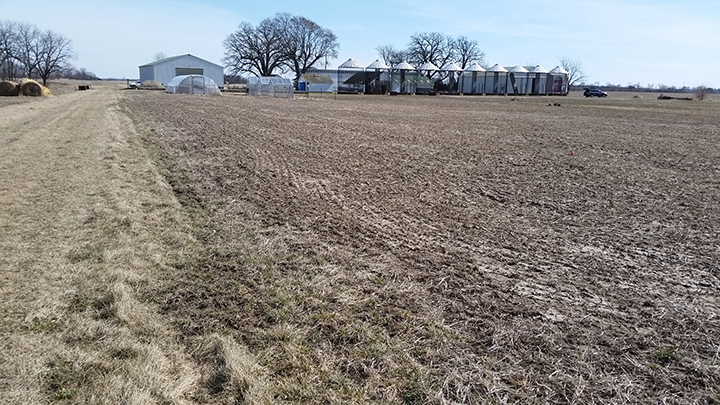
Before: Yellow Dog Flowers and Produce in March, 2017
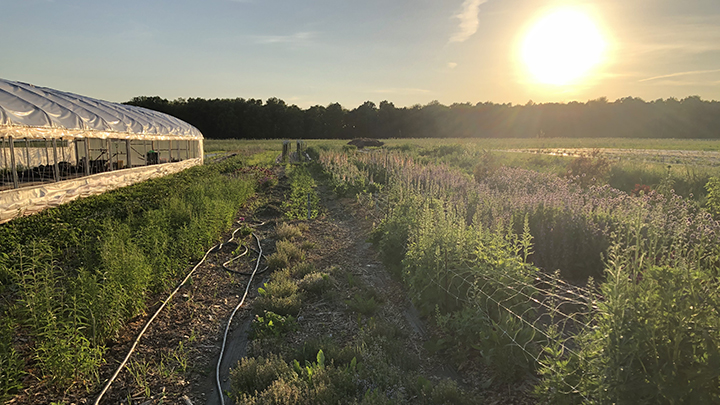
After: The same acreage in June, 2020
Molly Stentz had been a worker on organic farms for more than a decade. “I have always been interested in food and growing, since I was a child,” she said. John Peck, her partner in life and agriculture, found his life’s work in teaching environmental science and working for justice for marginalized farmers and farmworkers.
The two were looking at purchasing land to start a farm, but found prices out of reach. When Molly and John learned about Silverwood Farm’s Grower Partner program, Yellow Dog Flowers and Produce found its home. While both partners maintain off-farm jobs, they are seeing sales at their farmers’ market stand increase with each passing year. For now, income is mostly reinvested into growing the business.
Building an alternative to the global flower industry
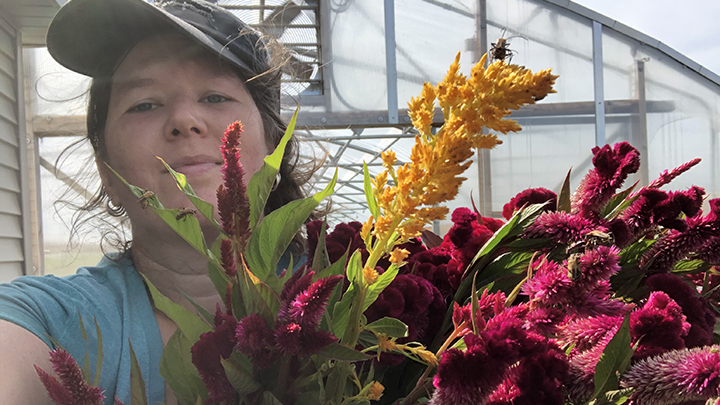
Molly at the farm with a harvest of celosia.
Molly’s passion is flowers—specifically, organically-grown, local flowers in season. “I see it as the next wave of organic production,” she said. “ I feel like the public doesn’t know about the environmental and social impacts of the globalized flower industry. You want to bring a loved one joy, and what you get is a flower that’s traveled thousands of miles and been doused in chemicals. There are numerous downstream effects on the communities where they’re being grown, the workers who pick and process them, and frankly, in your house. There’s just so much that goes into that industry that is problematic. We need a different model, a different mindset.”
By contrast, Molly’s flowers are grown in Silverwood Park, where they provide pollinator habitat and add to the beauty visitors enjoy, before the flowers are harvested and brought to market or styled for weddings and events. “We can offer things like dahlias, which are gorgeous and hard to ship,” she said. She envisions a future as part of a network of small farms providing local flowers in season.
Meeting infrastucture needs can be a struggle
Our grower partners require infrastructure that has been a challenge for the Dane County park system and Friends of SilverwoodPark to provide, but it’s getting better.
John said, “As a farmer, you need access to land, and you want some assurance of land tenure because you need to improve that soil, which is a multi year process. You need access to vehicles, irrigation, and the right set-up for processing, packing, and storage. It’s been real bootstrap at Silverwood.”
Yellow Dog Flowers and Produce invested in some of the infrastructure they needed including irrigation, a storage shed, and landscape fabric to reduce weed pressure. Silverwood Park provides a cooler for refrigerated storage. A federal NRCS grant allowed Yellow Dog to build a greenhouse.
Planning to meet our grower partner’s infrastructure needs is an ongoing conversation for the FOSP board and Dane County Parks. Donations to fund infrastructure projects are highly encouraged.
Grower Partners are part of Silverwood’s education mission
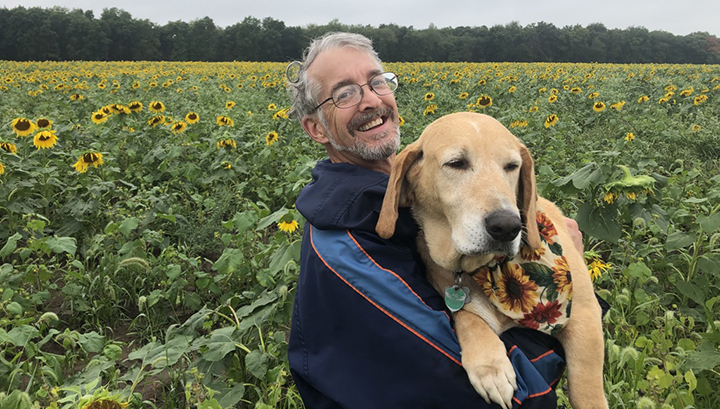
John with Honey Dawg, team member in charge of integrated pest management.
Farmers who become grower partners are expected to assist the Friends of Silverwood Park with public education. While the coronavirus pandemic has put educational programming at the park on pause, groundwork is being laid for the return of all kinds of education, from K-12 programs with Edgerton schools to training in areas of interest to backyard gardeners and innovative farmers.
For now, John and Molly are educating by putting up signs identifying the varieties of flowers and vegetables they are growing. John said,”I’ll be out there working and people stop to ask me all these questions. I’m happy to answer if I have the time.”
John has been involved with Edgerton summer school programs that taught plant taxonomy and pest management. “They all know what a Japanese beetle is,” he said.
“We’d love to see more field days,” Molly added. “There’s so much that could be done.”
Interview by Sarah White.

